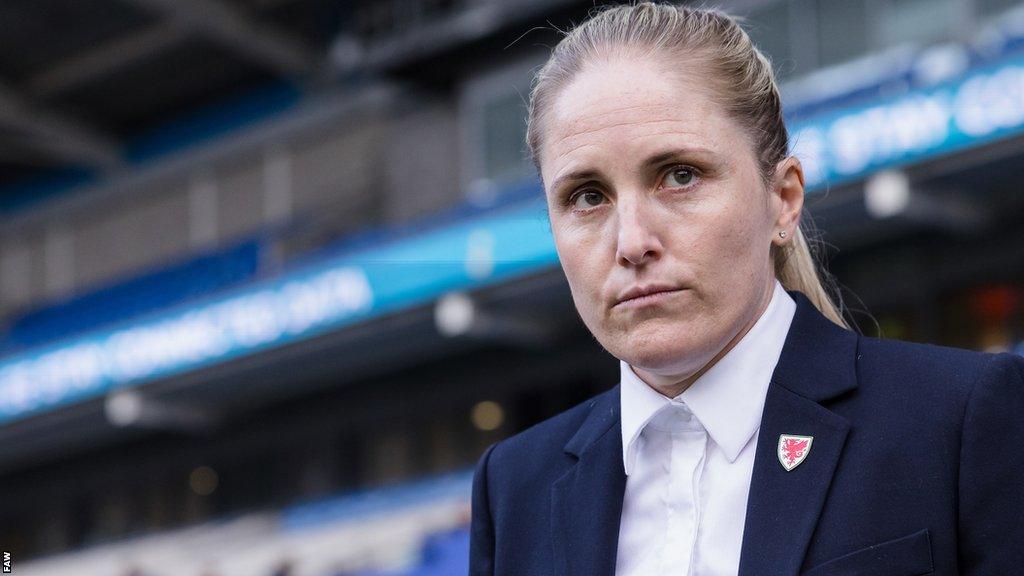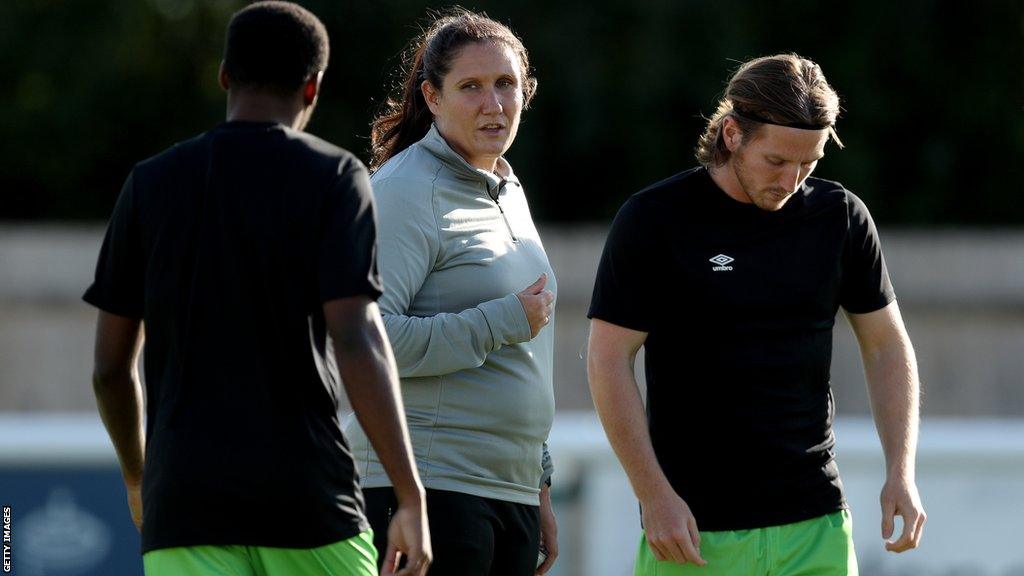Gemma Grainger: No reason why woman should not manage top men's side, says Wales boss
- Published

Gemma Grainger signed a new contract which runs until 2027 last January
Wales boss Gemma Grainger says there is no reason why a female coach should not manage a leading men's football team.
Hannah Dingley became the first woman to manage a professional men's side in English football when she was made caretaker boss at Forest Green Rovers in July.
Grainger believes the first permanent appointment of a female manager in the men's elite game may not be far away.
"It comes down to skillset," said the 41-year-old.
"If I go into a team and am asked to deliver a role as a coach, if I am the best at delivering that, you can trust a male or female to deliver.
"But it's a taboo isn't it. Women in society are still a taboo in many different roles.
"I have worked with boys in youth academies and because of the pressures at the highest level, there are some real soft skills that women can have. It's not that men don't have them - I am trying not to be too general, because that's not the case.
"But you can really get the best out of people in different ways.
"I know women who work with male players as physios, as physical performance coaches, as psychologists, and there's no reason that the next step where women are working with top players [as managers] to make them get better [should not happen] because it comes down to the individual."

Hannah Dingley was named Forest Green Rovers caretaker boss in July, but was quickly replaced by David Horseman
Grainger succeeded Jayne Ludlow as Wales boss in 2021 having spent 11 years working for the English Football Association (FA).
She began coaching schoolchildren when aged just 18 and went on to complete her coaching badges with the FA.
Grainger secured the top-level Uefa Pro Licence when aged just 32 - Emma Hayes and Paul Heckingbottom were among the notable names on her course - as well as studying for a degree in coaching.
Her first job in senior football was with Leeds United Ladies, with Grainger working on a voluntary basis and commuting three times a week from her hometown Middlesbrough.
She says football "is very much in the blood" as a result of her Teesside upbringing - which included watching Middlesbrough's men's side regularly - and cites her father as her biggest influence.
Speaking to this week's Elis James Feast of Football podcast, Grainger said: "My dad used to play football at quite a local level. I'd go to school and when I wasn't at school, I'd go to training with my dad.
Hannah Cain: Wales forward aims for impact after injury
"It would be Middlesbrough on Saturday, then watch my dad play on Sunday. From a really young age, four or five years old, that was a routine for me.
"When it comes to women's football now and you look at female players who are nine, 10 years old and female coaches who are 18, 19, I'd like to think they have got more in terms of role models in the women's game.
"But at the time for me it was solely the men's game, and it has been for quite a lot of my life.
"I was a season-ticket holder at Ayresome Park. There's pictures of me at eight, nine years old and it's just me in a Boro shirt surrounded by men.
"But that was very comfortable for me on Sunday when I used to watch football, my dad would play and I would get all the attention.
"I can walk round Middlesbrough town centre today and people will come up to me and remember me sitting on the sidelines or playing pool against me in the pubs.
"I can play any kind of pub sport - pool, darts - I am pretty good at it because I did it from four, five years old and I used to get beat. They didn't let me win."
Grainger's belief in Wales
Wales made history by reaching the World Cup qualification play-offs last year before losing in agonising fashion against Switzerland.
Grainger is convinced her team are on course to end the nation's wait for a first appearance at a women's major tournament by reaching Euro 2025.
In the short term, however, their focus is on the inaugural Women's Nations League, with testing away games coming up against Germany on Friday and Denmark on Tuesday, 31 October.
Wales lost their two Nations League fixtures so far, in Iceland and at home against the Danes, but Grainger says the level of competition in League A is ideal for her team's development.
"Do I think we have the potential to play at European Championships, at World Cups? Yes I do. I think the World Cup campaign showed that," she added.
"But I also think it's about not getting too ahead of ourselves too quickly, when we look at Switzerland and their history, Germany, Denmark.
"The history of these countries, the depth and the investment, are huge. We are at a very different stage and I stay focused on that.
"There are 16 places in the women's Euros, there are 24 in the men's. I have said this openly, if there were 24 places in the women's Euros, we would qualify every single time.
"But we have to get into the top 16, which by the way is a huge challenge. The only way we are going to do that is by playing teams who are going to take us to the line."